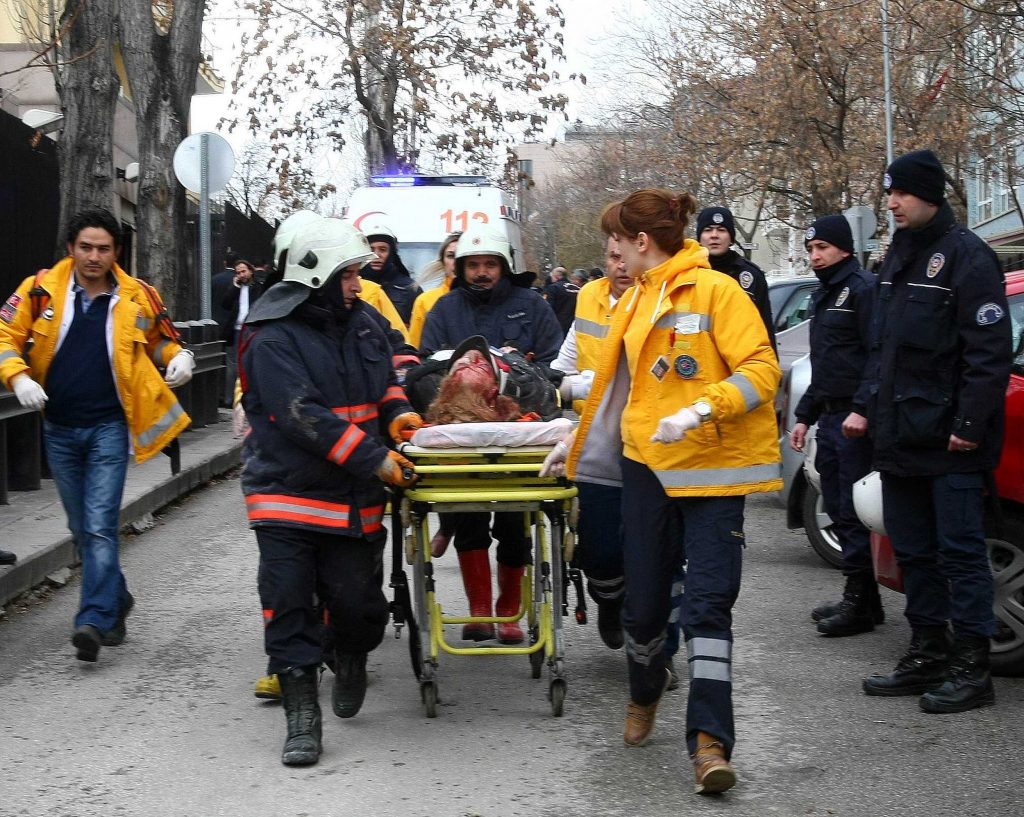A suicide bomber detonated an explosive strapped to himself Friday in front of the U.S. Embassy in Ankara, killing himself and a Turkish guard, the AP reported.

AFP/Getty Images
(AFP/Getty Images)
The attack destroyed the entrance to the building, Turkey’s foreign minister said, and the force of the explosion left body parts strewn around the scene.
White House press secretary Jay Carney told reporters that the bombing “was clearly an act of terror.”
Turkish media identified the bomber as Ecevit Şanli, allegedly a 30-year-old member of the outlawed Revolutionary People’s Liberation Party/Front (DHKP/C).
If the reports are true, it might mean that the terrorist group, which some experts describe as long past its heyday, is seeing a revival now that the Syrian conflict has given the U.S. and Turkey new reason to cooperate on foreign policy.
The DHKP/C is a Marxist-Leninist party and terrorist group that strongly opposes any NATO or U.S. influence over foreign policy in Turkey. For the past few decades, they’ve targeted a series of Western and Turkish officials, professors and businessmen with suicide bombings.
Today’s attack is similar to another suicide bombing on Sept. 11, 2012, when an explosion in a police station in Istanbul’s Sultangazi district killed a police officer and the bomber.
The group was far more popular in the ’70s and ’80s, though, and it has lost much of its influence since then.
“It went from being a group with mass appeal to one with just a few hundred members,” Soner Cagaptay, an expert on Turkey at the Washington Institute for Near East Policy, told the Daily Beast. “They see the world through the prism of the Cold War. It’s really kind of surprising they’re still around.”
But Turkey’s recent cooperation with the U.S. on Syria might have given the group a new raison d’etre.
Friday’s attack could have been prompted by Turkey’s cooperation with the U.S. in preventing spillover from Syria’s civil war in Turkey, as Reuters reported:
Turkey is a key U.S. ally in the Middle East with common interests ranging from energy security to counter-terrorism and has been one of the leading advocates of foreign intervention to end the conflict in neighboring Syria.
Around 400 U.S. soldiers have arrived in Turkey over the past few weeks to operate Patriot anti-missile batteries meant to defend against any spillover of Syria’s civil war, part of a NATO deployment due to be fully operational in the coming days.
The attack may have also been retaliation for the detention of more than 50 alleged DHKP/C members by Turkish police last month, but that wouldn’t explain why it occurred at the U.S. Embassy.
One DHKP/C splinter group called the “Urgent Ones” has reportedly been attempting to stir up sectarian conflict around Turkey in the hope that the Turkish government will abandon its anti-Assad policy.
“Using the leftist, anti-U.S. and anti-E.U. ideological campaigns overtly laced with anti-imperialist jargon, the group strives to broaden support for the Assad regime,” wrote Abdullah Bozkurt, a columnist for the Turkish paper “Today’s Zaman.”
via Turkey bombing: What is the DHKP/C terrorist group?.
https://www.washingtonpost.com/news/worldviews/wp/2013/02/01/turkey-bombing-what-is-the-dhkpc-terrorist-group/



